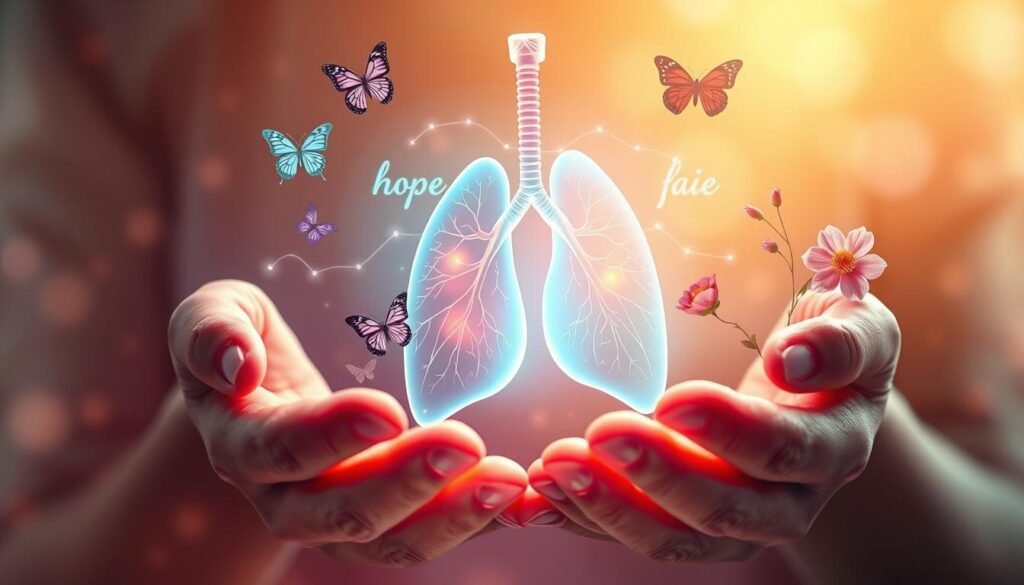About 70% of lung cancer patients feel really overwhelmed after being diagnosed. The mental impact of hearing you have lung cancer is as big as the physical problems it brings. Dealing with this news makes a person’s world feel turned upside down. It brings out anger, fear, and sadness. Knowing about these emotional signs of lung cancer is key for patients and their supporters. If emotional stress is not dealt with, it can really affect a person’s health and how well treatment works.
Looking at the emotional effects of lung cancer shows it’s not a battle to face alone. Families, friends, and doctors all need to work together. We will look at the emotional side of lung cancer. We’ll talk about different feelings that come up, how common they are, and ways to handle emotions during treatment.
Key Takeaways
- Emotional symptoms of lung cancer can include anxiety, anger, and sadness.
- A significant percentage of lung cancer patients feel overwhelmed when diagnosed.
- Support groups can be effective in aiding emotional management.
- Maintaining a healthy lifestyle is crucial for emotional well-being.
- Communication with friends and family enhances support networks.
- Engaging in relaxation techniques can help manage stress and anxiety.
- Seeking professional help may be necessary for some patients to navigate their emotional responses.
Understanding the Emotional Impact of Lung Cancer
Lung cancer diagnosis can stir up a lot of tough emotions. Patients often feel shocked, scared, and angry. These feelings can greatly change a person’s life for the worse. Spotting lung cancer emotional signs is crucial for taking care of one’s emotional health.
Common Emotional Reactions Upon Diagnosis
When people find out they have lung cancer, they might feel confused or incredibly sad. They often feel:
- Fear of the unknown
- Anger towards their situation
- Anxiety about the future
- Sadness over lost opportunities
- Overwhelm from treatment options
These emotions are common among lung cancer patients. Research shows about 60% of people with lung cancer struggle with mental health. Learning about these feelings and knowing when to get help is important. Support from doctors and loved ones is vital for dealing with these emotions.
The Importance of Acknowledging Feelings
It’s key to admit and validate how you’re feeling when dealing with lung cancer. Some patients might not want to talk about their feelings, worried they’ll upset others. But keeping quiet can make things feel harder. It’s often crucial for lung cancer patients to talk about their feelings.
Talking to counselors, joining support groups, and communicating with healthcare professionals can help. Learning more about the emotional impact of lung cancer is the first step towards recovery. By opening up about their feelings, patients find new ways to handle their difficulties.
Emotional Symptoms of Lung Cancer
It’s key to notice emotional symptoms in people with lung cancer. Feelings of distress can greatly affect their quality of life and willingness to follow treatment. Many lung cancer patients face emotional issues, which can impact their health.
Prevalence of Emotional Distress in Lung Cancer Patients
A lot of lung cancer patients feel emotionally distressed. About 43.4% report having major emotional challenges. 69.6% of those studied were men around 60 years old. Whether someone is married also matters, affecting the emotional support they get. Many patients are retirees, showing that work life can affect one’s emotional state too.
Key Emotional Symptoms to Be Aware Of
People with lung cancer often feel anxious, depressed, and stressed. The average depression score was 4.55, and for anxiety, it was 3.84. Lung cancer brings not only physical hardship but also deep mental health struggles. Feeling overwhelmed by the diagnosis stresses the need for emotional health care.

Spotting these emotional symptoms early can really help improve life quality for lung cancer patients. Creating strong support systems is vital to treat the whole patient, not just the cancer.
Common Emotional Signs to Recognize
Lung cancer can lead to various emotional reactions that affect mental well-being. It’s important for patients and their families to understand these signs. Learning about overwhelm, anxiety, and depression related to lung cancer helps in finding effective coping methods and support.
Feelings of Overwhelm and Anxiety
Lung cancer diagnosis can make patients feel overwhelmed. This often shows up as anxiety, with symptoms like fast heartbeat and tight muscles. The uncertainty of what comes next with diagnosis and treatment heightens these feelings. Managing these emotions is key to maintaining overall health.
Understanding Anger and Its Symptoms
Feeling angry is a common response to lung cancer. This frustration might come from the diagnosis, available treatments, or health changes. Such anger can strain relationships with family and friends. Recognizing and dealing with anger in healthy ways is crucial for improving communication and bonds with others.
Anxiety and Depression Associated with Lung Cancer
About 1 in 8 people with lung cancer will face depression. The condition can also increase anxiety and depression risks, making support essential. Women and younger patients under 55 are especially at risk of major depressive disorder. Acknowledging these emotional challenges is the first step towards seeking supportive care and enhancing life quality. For details on how therapy can help, visit this resource.
Factors Contributing to Emotional Distress
Lung cancer patients’ emotions are shaped by many things. Knowing these factors is key for the right emotional care. Age and gender specially affect how patients feel. Young patients and women often have a harder time, feeling more emotional pain. Age and gender differences are crucial in deciding how to help and support them.
Age and Gender Differences in Emotional Responses
Younger lung cancer patients often feel very upset when diagnosed. They might feel anxious or despair, leading to a worse life quality. Women tend to be more distressed than men. It shows we need care plans that think about both age and gender.
The Role of Social Support and Isolation
Having people around helps patients feel better. Those with strong networks of friends or family do better emotionally. But being alone can make patients feel lonely and more anxious. Good social ties can make a big difference in wellbeing. It’s key for mental health experts to help build these support networks. They help patients handle the stress of cancer better.

Coping with Emotions in Lung Cancer
Dealing with lung cancer involves a lot of emotions. It’s vital to manage these feelings well for patients and their families. Knowing how to communicate and lean on others is key. Here, we will explore helpful ideas and ways to cope.
Strategies for Managing Emotional Symptoms
If lung cancer is affecting your emotions, there are ways to feel better. Here’s what can help:
- Open Communication: Talking openly with family, friends, and doctors is important. It helps you share what you’re going through.
- Professional Support: Mental health experts can give advice that helps you stay strong.
- Support Groups: Meeting with people in similar situations can make you feel less alone. They understand what you’re facing.
- Utilizing Resources: Centers like the Mays Cancer Center have many services. They offer counseling and ways to cope. You can get in touch by calling 210-450-1000.
The Importance of Communication and Support Networks
A strong support network is critical. Communicating and creating strategies for emotional health are important.
- Regular Check-Ins: It’s good to stay connected with loved ones. Sharing how you feel helps improve your mood.
- Accessing Professional Help: If you need someone to talk to, the Macmillan Support Line (0808 808 0000) and the Samaritans (116 123) are there for you.
- Exploring Online Communities: Online groups like the Macmillan Community are great. You can share your thoughts and get advice from others who understand.
- Spiritual Guidance: Talking to spiritual leaders or chaplains can bring peace and support in tough times.
Emotional Self-Care for Lung Cancer Patients
Emotional self-care is crucial for lung cancer patients. It helps improve well-being. Breathwork, yoga, and mindfulness can lessen anxiety and stress.
Practicing Breathwork and Relaxation Techniques
Breathwork and relaxation techniques can soften the emotional impact of lung cancer. Deep breathing exercises bring about relaxation and lower anxiety. Tai chi and yoga boost mindfulness and emotional strength, enhancing mental and physical health.
Nutrition and Exercise as Emotional Support
Nutrition and exercise offer emotional support to lung cancer patients. Eating well can improve your mood and brain function. Staying active fights anxiety and depression. Working with a dietitian helps create enjoyable, nutrient-rich meals. Doing activities that you love can make you feel happy and fulfilled.
Mastering self-care techniques can help lung cancer patients handle stress and boost emotional health. Below are some key self-care activities:
| Self-Care Activity | Benefits |
|---|---|
| Breathwork | Reduces anxiety and promotes relaxation. |
| Balanced Nutrition | Enhances mood and energy levels. |
| Regular Exercise | Boosts self-esteem and alleviates fatigue. |
| Mindfulness Practices | Improves emotional resilience and reduces stress. |
| Peer Support Groups | Provides emotional support and shared experiences. |

Addressing Emotional Well-Being with Lung Cancer
Lung cancer can deeply affect emotions. It’s key to focus on emotional health during this time. Professionals in mental health offer crucial support. They help patients deal with fear, sadness, and worry that come with cancer. Therapy also improves mental health, aiding patients in expressing feelings and coping better.
Engaging with Professional Mental Health Resources
Finding a skilled mental health pro can boost the spirits of those dealing with lung cancer. Techniques like cognitive-behavioral therapy reduce anxiety and depression. It helps patients tackle the emotional challenges of their illness. Also, addressing loved ones’ stress can lessen guilt and preserve strong relationships. Talking to a specialist often brings comfort.
Utilizing Support Groups and Community Resources
Support groups let patients meet others facing similar battles. This connection promotes emotional health through friendship and empathy. These groups offer space to talk about how to cope and share stories. Activities like preparing meals or fun outings lessen loneliness. Clear communication helps caregivers give the right kind of support, creating a caring team for health.
Implications of Unmanaged Emotional Symptoms
Being diagnosed with lung cancer often brings emotional symptoms. If not managed, these can harm quality of life and treatment success. It’s important to know how emotional and physical health are linked, especially for lung cancer patients.
Effects on Quality of Life and Treatment Outcomes
About 46.5% of lung cancer patients feel depressed before any treatment. This sadness lowers life quality and makes treatment less effective. Patients with depression had higher Hospital Anxiety and Depression Scale (HADS) scores, showing that emotions greatly affect health.
Understanding the Connection Between Mental and Physical Health
The link between mental and physical health is key for lung cancer recovery. High emotional distress leads to worse life quality in many areas. Depression is linked to symptoms like coughing and chest tightness. Treatments like Mirtazapine can help with depression and improve physical symptoms.
| Description | Depressed Patients | Non-Depressed Patients |
|---|---|---|
| Prevalence of Depression | 46.5% | Not available |
| Median HADS Score | 17.0 (range 11-32) | 5.0 (range 0-10) |
| Reported Quality of Life | Significantly lower | Higher |
| Patients Reporting Psychological Distress | 34.6% | Not available |
Strategies for Managing Emotions During Treatment
Managing emotions during lung cancer treatment is a big part of the journey. Patients can find coping strategies that help them face the challenges of diagnosis and therapy. Learning about their condition helps build emotional strength.
Staying Informed and Empowered
Getting to know more about your cancer can help deal with emotions. Understanding your treatment options and knowing where to find support gives you control. It’s good to keep looking for information, from doctors or trusted websites. Talking about feelings is also helpful. It makes it easier to deal with problems. Many patients feel stressed, but learning that this is common can help. Support teams are very useful for emotional health. Visit supportive care teams for more info.
Finding Joy and Connection Amidst the Struggles
Finding happiness during tough times is key. Hobbies, time with loved ones, or community activities can boost your mood. These good moments help balance out the tough ones. Unfortunately, not many patients ask for help even when they’re overwhelmed. For example, only 14% of stressed patients in the USA get extra support. Knowing how important happiness and friends are can inspire you to find a good support network. Taking breaks, practicing mindfulness, and embracing joy are all part of healing.
| Emotional Health Statistics | Percentage |
|---|---|
| Patients experiencing anxiety/mood disorders during active treatment | 18% |
| Patients with any combination of anxiety, mood, or adjustment disorders | 30%-40% |
| Prevalence of any mental disorder in cancer patients | 32% |
| General distress in cancer patients | 35%-52% |
| Patients showing elevated distress at some screening points | 60% |
| Patients who indicated need for professional help with emotional problems (UK study) | 36% |
| Patients who reported a need for help with distress (Australian study) | 30% |
| Patients who completed appointments with supportive care after 14 days | 14% |
Conclusion
The feelings that come with lung cancer are often missed but are very important. Over 2,200 people with lung cancer were studied. It showed that many deal with emotional issues. These can be affected by their age, gender, and where they are in treatment.
It’s really important to notice and deal with these emotional challenges. If ignored, patients can feel worse and their life quality can drop. Knowing about these feelings helps in finding ways to cope.
People with lung cancer can face their feelings by taking care of themselves, getting help, and leaning on others. Using these methods can make a big difference. They can feel better emotionally and live better while dealing with cancer. Checking on patients’ feelings early can help doctors give the right support.
Seeing how emotions and health are linked shows why it’s key to care about lung cancer’s emotional side. With good support and ways to cope, patients can handle their treatment better. This isn’t just good for their minds, but for their overall health too.